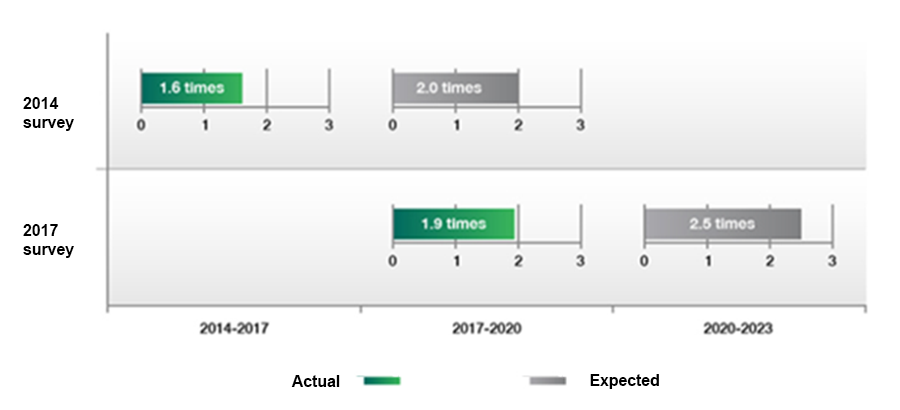Intellectual property and small and medium enterprises
According to a recently published report by the Canadian Intellectual Property Office (CIPO), Canadian small and medium enterprises (SMEs) aware of or holding formal IP are more likely to have expanded, or intend to expand, to domestic and international markets. Specifically, Canadian SMEs holding registered IP rights are 3 times more likely to have expanded domestically and 4.3 times more likely to have expanded internationally. Those that are aware of IP are 1.9 times more likely to have expanded domestically and 2.4 times more likely to have expanded internationally. The expectations are even more impressive: 3.8 times more likely to intend to expand domestically, and 5.4 times more likely to intend to export.
Figure 5: Likelihood of expected growth by SMEs holding IP

Figure 5 compares the expected growth to actual growth of SMEs holding IP. In 2014, SMEs holding IP were two times as likely to expect to grow and 1.6 times more likely to actually grow. These figures increased in 2017, where SMEs were 2.5 times more likely to grow and 1.9 times more likely to actually grow when they held IP
Source: Canadian Intellectual Property Office (CIPO)
Of particular concern is the survey result noting that while 59% of SMEs are at least slightly aware of patents; only 2% of SMEs hold at least one. That percentage needs to grow dramatically for Canada’s productivity and prosperity to grow in this economic era of intangibles.
Several recent reports show that a significant portion of IP created in Canada is eventually owned by foreign companies. For example, a study from the Institute for Research on Public Policy (IRPP) found that the majority of patents filed by research teams with at least one Canadian inventor are assigned to firms outside Canada or to foreign subsidiaries in Canada, and of the patents that are assigned to Canadian residents, a significant proportion are subsequently sold to foreign entities.
As noted here and in other studies, while Canada appears to have the human cap¬ital and infrastructure to support innovation, it falls short relative to other countries in investment in R&D, patent grants and incentives to advance to the commercialization and sustainable operation stages of the innovation process. Rather, patents on a large share of inventions developed with Canadian input are assigned to foreign companies. These observations suggest that Canada faces challenges not so much in invention, but rather in IP development and commercial exploitation.
IRPP Report, 2019